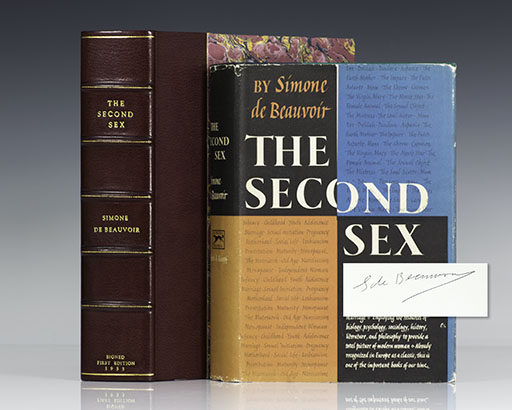2 Beauvoir’s The Second Sex
Now hear from Beauvoir herself. You will read some passages from the Introduction of The Second Sex, in which she lays out the main issues. First, you will see how she draws the distinction between essentialists and anti-essentialists. Note that she employs the term ‘nominalist’, which in this context means anti-essentialist, as defined earlier.

Activity 2 Simone de Beauvoir – The Second Sex (Part A)
Read the extract reproduced from The Second Sex then answer the following questions.
[W]hat is a woman? ‘Tota mulier in utero: she is a womb,’ some say. Yet speaking of certain women, the experts proclaim, ‘They are not women’, even though they have a uterus like the others. Everyone agrees there are females in the human species; today, as in the past, they make up about half of humanity; and yet we are told that ‘femininity is in jeopardy’; we are urged, ‘Be women, stay women, become women.’ So not every female human being is necessarily a woman; she must take part in this mysterious and endangered reality known as femininity. Is femininity secreted by the ovaries? Is it enshrined in a Platonic heaven? Is a frilly petticoat enough to bring it down to earth? Although some women zealously strive to embody it, the model has never been patented. It is typically described in vague and shimmering terms borrowed from a clairvoyant’s vocabulary.
If there is no such thing today as femininity, it is because there never was. Does the word ‘woman’, then, have no content? It is what advocates of Enlightenment philosophy, rationalism or nominalism vigorously assert: women are, among human beings, merely those who are arbitrarily designated by the word ‘woman’; American women in particular are inclined to think that woman as such no longer exists. If some backward individual still takes herself for a woman, her friends advise her to undergo psychoanalysis to get rid of this obsession. Referring to a book–a very irritating one at that–Modern Woman: The Lost Sex, Dorothy Parker wrote: ‘I cannot be fair about books that treat women as women. My idea is that all of us, men as well as women, whoever we are, should be considered as human beings.’ But nominalism is a doctrine that falls a bit short; and it is easy for anti-feminists to show that women are not men. Certainly woman like man is a human being; but such an assertion is abstract; the fact is that every concrete human being is always uniquely situated. Rejecting the notions of the eternal feminine, the black soul or the Jewish character is not to deny that there are today Jews, blacks or women: this denial is not a liberation for those concerned, but an inauthentic flight. Clearly, no woman can claim without bad faith to be situated beyond her sex.
Notes: Beauvoir mentions a ‘Platonic heaven’. ‘Platonic’ is the adjective derived from the name of the philosopher Plato. ‘Platonic heaven’ is the perfect realm of ideas, such as goodness and beauty. For Plato, the imperfect world that we perceive receives its characteristic from those ideas, but can never reach their perfection. For instance, we can see a beautiful object, which relates to the perfect idea of beauty, but never equals it. In the context of The Second Sex, this means that some people think that there is a perfect idea of woman, to which concrete women relate, and possibly aspire to. In the vocabulary that we have also used, this would be the ‘essence’ of woman, which essentialists think exists. ‘Femininity’ is also here an equivalent to the ‘idea of woman’ and ‘essence of woman’.
Beauvoir also mentions Enlightenment philosophers and rationalism. The former lived in the eighteenth century, and advocated that each human being should use his or her reason in all aspects of life, rather than relying on authority, tradition or religious belief. Rationalism is a type of philosophy which emphasises the use of reason in the acquisition of knowledge, generally as opposed to the use of our senses. Dorothy Parker (1893-1967) was an American writer, poet and satirist.
Analyse Beauvoir’s arguments, but also note her tone, looking out especially for irony when she presents ideas that she opposes.
1. Where in the text does Beauvoir describe the position that Gutting presents as ‘essentialist’? What does she think of it?
Answer
In the first paragraph. She points out that in fact there is no clear idea of what ‘femininity’ (the essence or perfect idea of woman) is.
2. Where does Beauvoir describe here the position that Gutting presents as ‘anti-essentialist’, or nominalist? What does she think of it?
Answer
In the second paragraph she points out that many philosophers, as well as contemporary intellectuals and apparently American women, tend to deny that there is a feminine nature, or essence. She thinks that anti-essentialism/nominalism is wrong, because in fact women, as distinct from men, do exist.
3. In the last sentence, she employs the expression ‘bad faith’. What does that last sentence mean?
Answer
The sentence means that a woman who claims that she lives as a human being in general, rather than a woman, deceives herself.
